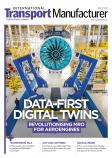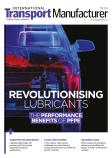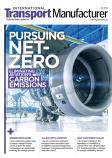With sustainability on the agenda across the industry, Juliet Elliot looks at how one supplier is evolving
Our entire society is facing the global challenge of maintaining mobility while conserving valuable resources. Thanks to their low weight, plastics are the ideal solution for many transport applications; these lightweight material choices have an important role to play in reducing greenhouse gas emissions and overall fuel consumption. Another important factor to consider at the design stage of any vehicle is how to deal with it at the end of its working life. This is why recycling is now so important.
Thermoplastic specialist Simona has been reorganised to emphasise the transport applications of its products. Based in Kirn, Germany, the company already produces some 35,000 products every year, and now with a new strategy entitled ‘Grow Together’ has introduced a philosophy of working more closely with customers to make the industry more sustainable.
Product Developments
Simorail is a new recyclable plastic that was developed collaboratively with thermoformers across Europe, Asia and North America by experienced R&D staff who are closely connected to the market. Aimed at designers, railcar builders, interior component suppliers and thermoformers, as well as OEMs, the material complies with all major fire standards such as EN 45545 and NFPA 130 at the highest level required. This creates a flexible product useful for a range of railway interior applications such as seats, armrests, cladding, partitions, ceiling sections or shelves.
Thanks to the thermoformability of Simorail sheets, it is also possible to produce, in short cycle times, highly complex parts featuring a high-quality surface appearance and texture retention. This is especially timely given the current trend of replacing non-recyclable materials. Simorail plastics have integral colour throughout, which reduces maintenance time when it comes to cleanability and repair costs throughout the lifetime of the part, another important environmental consideration.
Compared with traditional materials such as metal or glass fibre-reinforced plastics, Simorail sheets offer significant weight savings (currently up to 15%) reducing overall costs and CO2 emissions. Even material waste is returned to the production process. Due to a long service life, items need to be renewed less frequently, making them much more resource-efficient.
In the aviation world, industry giants Airbus, Bell and Boeing all specify Simona’s Boltaron aircraft-rated PVC alloy sheet products for thermoformed and fabricated interior components. Boltaron products offer a large variety of textures and colours. Other sector leaders such as North American Bus and Orion Bus specify Boltaron’s Docket 90A-rated PVC/acrylic sheet products for thermoformed, fabricated and machined interior components. In addition to meeting stringent specifications for low smoke, flame spread and heat release, these sheets offer high impact resistance, unlimited textures, numerous scratch-resistant metallic colours, high resistance to harsh cleansers and outstanding thermoformability.
The company is constantly targeting innovation in new sectors, and is particularly interested in the overall trend towards sustainability. Research is ongoing into e-mobility by producing low-weight casings for batteries. Hydrogen storage tanks and tube systems for trucks are also possible areas of application in the future and are currently under development.

















